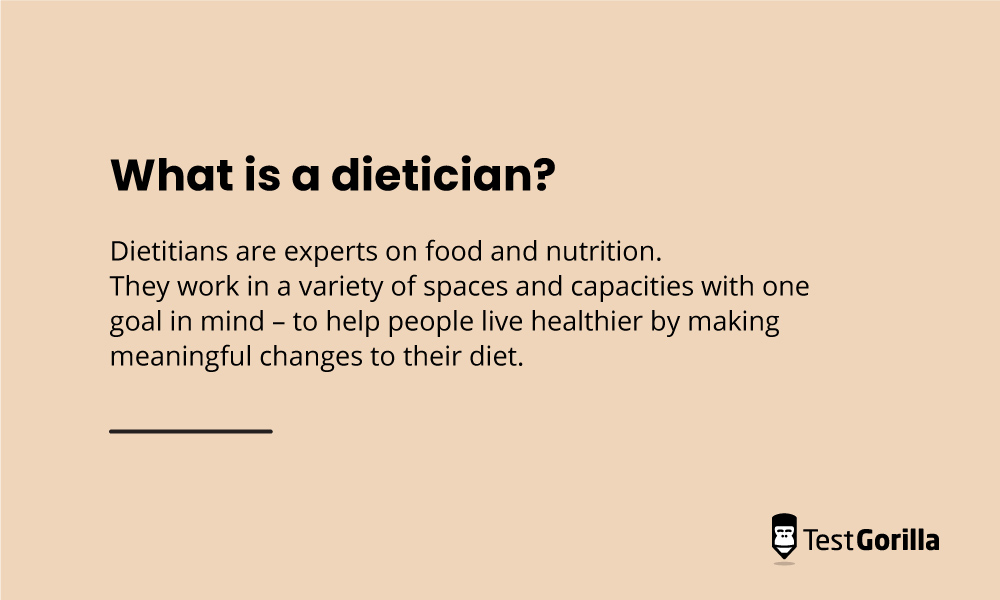All Categories
Featured
Table of Contents
-1
In the USA and several various other nations, a dietitian is a board-certified food and nourishment expert. They are extremely educated in the area of nourishment and dietetics the science of food, nutrition, and their effect on human health and wellness. Via substantial training, dietitians acquire the proficiency to supply evidence-based clinical nourishment treatment and nutritional therapy tailored to fulfill an individual's demands.
-1To clear up, the qualifications of RD and RDN are interchangeable. RDN is a much more recent classification. Dietitians can select which credential they prefer to make use of. To gain these qualifications dietitians-to-be must first gain a bachelor's degree or equal credit reports from an approved program at an university or university. Typically, this calls for an undergraduate science level, consisting of training courses in biology, microbiology, natural and not natural chemistry, biochemistry, anatomy, and physiology, in addition to even more customized nourishment coursework.
Best Registered Dietitian
-1This permits them to analyze acute requirements, prioritizing serious conditions. Inpatient and outpatient dietitians additionally supply nutrition education to people with specialized demands, such as those recently out of surgical treatment, in cancer cells treatment, or diagnosed with chronic health problems like diabetes mellitus or kidney illness. In the outpatient setup, they offer much more thorough dietary therapy functioning towards a nutrition-oriented goal.
-1Study dietitians usually function in research health centers, companies, or colleges. As soon as dietitians have actually gained their credentials and are working in the area, they can go on to specialize in a particular subcategory, such as pediatric medicines or sporting activities dietetics.
-1They may in addition teach in a scholastic or research establishment or cover nutrition-related topics. Others may work as health and nourishment specialists in media or as public speakers. Dietitians are certified to take care of nutrition treatment across a span of acute and chronic problems. The sort of conditions they treat depends most on the setting of their technique.
Registered Nutritionist
-1In many states, such as Alaska, Florida, Illinois, Maryland, Massachusetts, and Pennsylvania, RDs and CNSs are given the very same state license, normally called a Licensed Dietitian Nutritionist (LDN) license. In states that do not control using this term, anybody with a rate of interest in diet plan or nourishment might call themselves a nutritionist.
-1Since uncredentialed nutritionists typically lack the experience and training for clinical nutrition treatment and nourishment therapy, following their suggestions could be thought about harmful (). Prior to consulting a nutritional expert, you might wish to examine whether your state manages that may utilize this title. In the U.S. states that do not manage the term, no degrees or credentials are called for to be a nutritional expert.

-1
In states that do mandate licensure, the CNS or RD credential may called for. Those with CNS credentials are wellness professionals like nurses or doctors with sophisticated health levels that have looked for out additional coursework, finished monitored technique hours, and passed a test looked after by the Board for Certification of Nutrition Specialists.
-1While several of these strategies may have durable scientific support, others may not. Offering nourishment advice without the appropriate expertise and training can be damaging, especially when counseling those with wellness problems. Therefore, if you are considering getting in touch with a nutritionist, you may intend to ask if they are a CNS or have state licensure or qualification, or an additional credential.
Dietitian Consultation – Golden Bay 6174
-1A number of states especially regulate this term. Furthermore, nutritionists might go after an advanced CNS qualification.
-1It can be challenging to aid individuals make real, long-term modifications in their lives. Both dietitians and nutritional experts offer a variety of nutrition-based solutions to clients.
-1They should have completed some level of education in their area. They are likewise called for to have finished as much as a year of monitored work, working within a guided program at a medical care facility, catering business, or community body. Dietitians have much greater assumptions positioned on their capabilities and level of professionalism.
-1This implies that there is no body that supervises their credentials and no particularly rigid standards that nutritionists demand to follow in order to be able to practice. Dietitians, on the various other hand, are registered with country wide identified bodies, such as the Dietitians Organization of Australia. They must follow the National Competency Standards for Dietitians.
Holistic Dietitian – Golden Bay

-1
Nonetheless, you can exercise as a nutritional expert without the very same level of accreditation as a dietitian. Nutritional expert programs can vary in size and top quality, with some as short as 6 weeks and covering far less material than a dietetics training course. Depending on your education supplier, you can acquire a substantial amount of knowledge with studying a basic nutrition course; nonetheless it is essential to explore the program content prior to beginning.
-1This can include going to industry seminars or reading industry publications. Nutritional experts, on the other hand, typically earn their certifications in order to supplement other qualifications and give much better suggestions to their customers. Nutritionists can obtain employment in a variety of fields, including public health recommendations, recommendations for individuals, and collaborating with private organisations.
-1Nutritional experts can collaborate with showing off organisations, health clubs, colleges and advise media electrical outlets on standard terms and correct use of terms. Often, people will look for the solutions of a nutritional expert to help them in obtaining into form. Dietitians can work in most of the very same duties as nutritional experts. With a greater degree of accreditation, they can quickly go into a duty that a nutritionist would hold, supplied they are or else equal.
Pediatric Diet Planning
-1Dietitians usually deal with more clinically sensitive clients. These can include those with diabetic issues, allergies, excessive weight, cancer and gastrointestinal diseases. Due to the fact that of the high degree of knowledge needed to offer services to these people, only certified dietitians are permitted to provide treatment. Some of the greater degree duties with medical care institutions can be very gratifying, and pay quite well.
-1In Australia there is a distinction between a dietitian and other nutritional wellness providers consisting of nutritionists. All dietitians are nutritionists, yet nutritionists without a dietetics qualification can't call themselves a dietitian. While there are resemblances in between a dietitian and nutritional expert there are distinctions in qualifications and policy. The dietetic occupation is managed and meets stringent standards as set out by the National Partnership of Self Regulating Health And Wellness Professions (NASRHP).
-1Dietitians with the Accredited Practising Dietitian (APD) credential commit to recurring training and education throughout their careers. As a career, nutritional experts are not regulated in Australia under NASRHP or accredited under a solitary governing body.
Telehealth Nutritionist – Rockingham
-1If you have a persistent health problem and a treatment strategy from your GP, you may be able to declare a Medicare discount when you see an APD. Find out more concerning aid with expenses when seeing a dietitian. The main objective of people functioning in the occupation of dietetics is personified in this statement: The occupation of dietetics contributes to the promo of health and wellness and the prevention and treatment of illness by optimising the nutrition of populations, communities and individuals.
Latest Posts
Supermarket Tours
Eating Disorder Management – Dianella 6059
Eating Disorder Faq - Perth (Shoalwater )